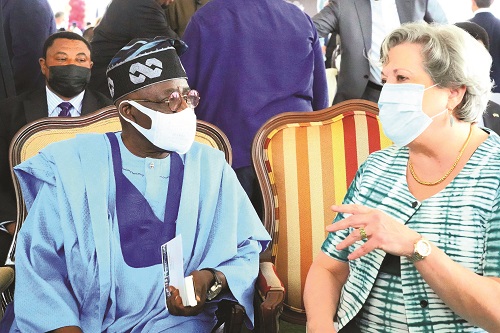Top Stories
Why US Is Building World’s Largest Consulate in Lagos

The United States Government yesterday flagged off the construction of its $537million (approx N223,257,750,000) new Consulate-General campus in Lagos.
The 10-storey building to be sited on 12.2 acres in the Eko Atlantic City, Victoria Island, will on completion in 2027, be the largest US Consulate in American history, anywhere in the world.
The complex will pump an estimated $95million (about N39,496,250,000 billion) directly into the Lagos State economy. About 2,500 Nigerian engineers, architects, artisans, construction and administrative workers will be involved in the construction.
Lagos State Governor Babajide Sanwo-Olu joined the U.S. Ambassador in Nigeria, Mary Beth Leonard, and Consul-General Claire Pierangelo, at what was described as “a historic groundbreaking” at the Eko Atlantic City.
They noted that the project would further strengthen the bilateral friendship and partnership between the U.S and Nigeria.
Leonard explained that the facility would support diplomatic and commercial relations between the two nations as well as provide a safe, secure, sustainable, and modern workplace for employees.
The ambassador added that some of the Nigerians to be involved in the project would learn new technical skills and safety awareness that would distinguish them in the local market.
Asked by The Nation why the US opted to site the project in Nigeria, she explained that the need to sustain the “ incredible relationship” between the two nations informed the decision. .
Leonard added: “You heard earlier my remark that some 200,000 Nigerians come streaming through our doors for consular, visa services.
“There are, maybe, 100,000 Nigerian-Americans living here (Lagos). There is so much going on here. So, that’s the space that we need to succeed.”
Thanking the Federal and Lagos State governments for their support, she said: “Our vision for this remarkable Consulate campus is to create a facility that both honours the vibrant relationship between the United States and Nigeria and communicates the spirit of American democracy, transparency and openness.”
Consul-General Claire Pierangelo also said: “Nigeria and the United States have a long-standing history of people-to-people engagement fostering bridges between our two nations.”
Sanwo-Olu said the project “promises to put Lagos on the global map in terms of the climate change and energy efficiency.
His words: “When completed, this campus will represent boundless new opportunities for Nigerians and Americans that will come into this facility.
“This represents more than a billion dollars investment and I’m told that over $100million will be a local investment.
“This money, we believe, will go directly into our local economy during the construction and will help all of our small, medium enterprises, young designers, very creative artists and everybody that will be working on this campus, I’m sure will have a worthwhile experience.”
Sanwo-Olu noted that what is now the Eko Atlantic is the product of a bold, ingenious reversal of “what used to look like a liability into an asset,” because of ocean surges and climate change.
“At that time I was also privileged to be in a cabinet that said ‘Not under our watch’ would we let nature wipe us off the face of the earth,” he added.
Sanwo-Olu credited former Lagos State Governor Bola Tinubu with the vision for and resourcefulness that enticed investors to start the Eko Atlantic City project.
Sanwo-Olu said: “There is also another gentleman here, who was the governor that took the bull by the horn and got a few crazy, audacious friends who said ‘we can reverse this. It would look as if we are throwing money into the Atlantic Ocean but we would recreate a new city.’ Today, let’s give it to Asiwaju Bola Ahmed Tinubu.”
He also thanked the Chagoury brothers, Gilbert and Roland, “for believing that a new city can indeed rise from Lagos.”
–The Nation
